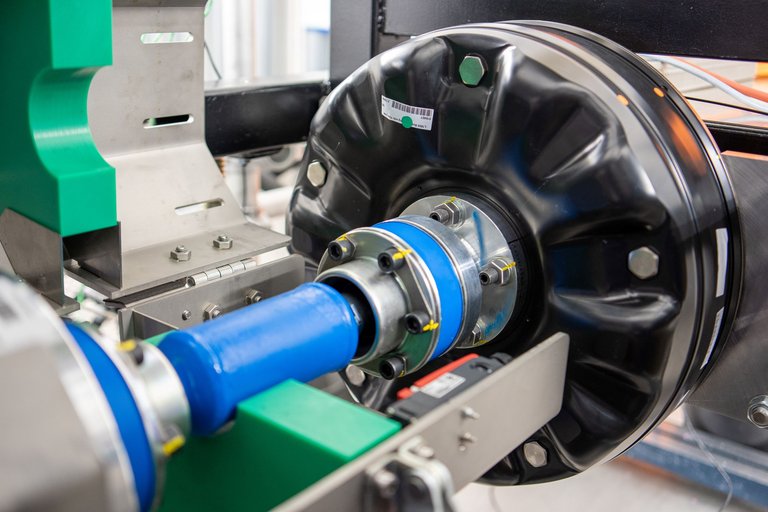Vehicle researchers from TU Ilmenau have presented an innovative testing system at the WCX SAE World Congress Experience from 13 to 15 April in Detroit, which will enable faster development of electric vehicles. The congress is organized by the Society of Automotive Engineers (SAE), which was founded in 1905 by Henry Ford, among others, and today unites more than 138,000 members worldwide.

The massive increase in demand for electric vehicles poses major challenges for the automotive industry. In addition to new battery technologies and the expansion of the charging infrastructure, vehicle components and systems - from the chassis to the engine - must be adapted or even completely redeveloped. Since modern electric vehicles are made up of components and systems with widely varying degrees of technological maturity, research is being conducted worldwide into standardized vehicle components.
TU Ilmenau coordinates international research project
In the large-scale, international research project "Connected and Shared X-in-the-loop Environment for Electric Vehicles Development (XILforEV)", which is coordinated by TU Ilmenau, scientists and engineers are developing a test system to accelerate the development of new components and systems for electric vehicles. Until the end of 2021, nine industry and research partners from six European countries will be researching an innovative X-in-the-loop test and inspection environment, i.e. a research and development platform in which all test benches and highly complex information technology are networked.

Excellent X-in-the-loop test infrastructure
The excellent X-in-the-loop test infrastructure of the Thuringian Innovation Center for Mobility (ThIMo) is available for research work at the TU Ilmenau and can be used to simulate a wide variety of realistic conditions. This enables the scientists to carry out virtual tests in different driving scenarios, for example to increase energy efficiency or driving safety or even driving comfort. In doing so, the scientists permanently evaluate the relevant components of the vehicle system in real time according to whether the targeted requirements for electrification and automation of new vehicle systems have been met or whether there is still a need for optimization. At the same time, the entire test system itself is repeatedly validated on the basis of the experimental data, i.e. its suitability as a test environment is checked.
Test system for faster development of electric vehicles
The ambitious goal of the research team led by the project manager of the XILforEV project, Dr. Valentin Ivanov, acting head of the Department of Automotive Engineering at TU Ilmenau, is a test and inspection system that will allow electric vehicles to be developed and manufactured more easily and quickly. Dr. Ivanov:
The vision is complex electric vehicles that are not only reliable and safe, but also energy-efficient. Such fail-safe, intrinsically tuned and sustainable vehicles can only be developed in a test and verification environment like XILforEV.
At the international WCX SAE World Congress, Dr. Ivanov moderated a session dedicated to EU projects on innovative vehicle concepts.
Networked research in six countries
The new XILforEV test procedure developed at TU Ilmenau brings together test setups and platforms located in different places in Europe in an X-in-the-loop network. While the Ilmenau scientists at the Thuringia Innovation Center for Mobility are researching, among other things, the overall concept of X-in-the-loop technologies, the German vehicle partners Audi and EFS GmbH are working on braking systems for electric vehicles, the Slovenian company Elaphe is working on drive units, the Belgian supplier Tenneco is working on active chassis systems, the Spanish Instituto Technologico De Aragon is working on machine learning, the Belgian-French partner Siemens Industry Software is working on XIL-relevant software products, and the Dutch TU Delft is working on XIL-related products.and at the Dutch TU Delft on the human factor. The simultaneous execution of test scenarios with the help of coupled platforms and devices makes it possible to identify correlations between the various processes much faster than if the multitude of work steps had to be carried out one after the other.
World's first experimental platform at the TU Ilmenau
The XILforEV project is being funded for three years with around 3.5 million euros as part of Horizon 2020, the most important European framework programme for research and innovation. When it is completed at the end of the year, the world's first test platform of its kind will have been created at TU Ilmenau, which can be used to flexibly and extremely quickly test new types of powertrain and chassis systems for electric vehicles. Since both research institutions and globally active vehicle companies are working together in the XILforEV consortium, the research results can be transferred directly to industry in the future. This would benefit not only car manufacturers and suppliers, but above all the buyers of ultra-modern electric vehicles.
XILforEV Project Consortium:
- Ilmenau University of Technology, Coordinator (Germany).
- Audi AG (Germany)
- Elaphe Pogonske Tehnologije (Slovenia)
- Elektronische Fahrwerksysteme GmbH (Germany)
- Instituto Technologico De Aragon ITAINNOVA (Spain)
- Siemens Industry Software (Belgium & France)
- Technical University of Delft (Netherlands)
- Tenneco Automotive Europe BVBA (Belgium)
Further information about the XILforEV project
Contact
Dr. Valentin Ivanov
Acting head of the Automotive Engineering Group

